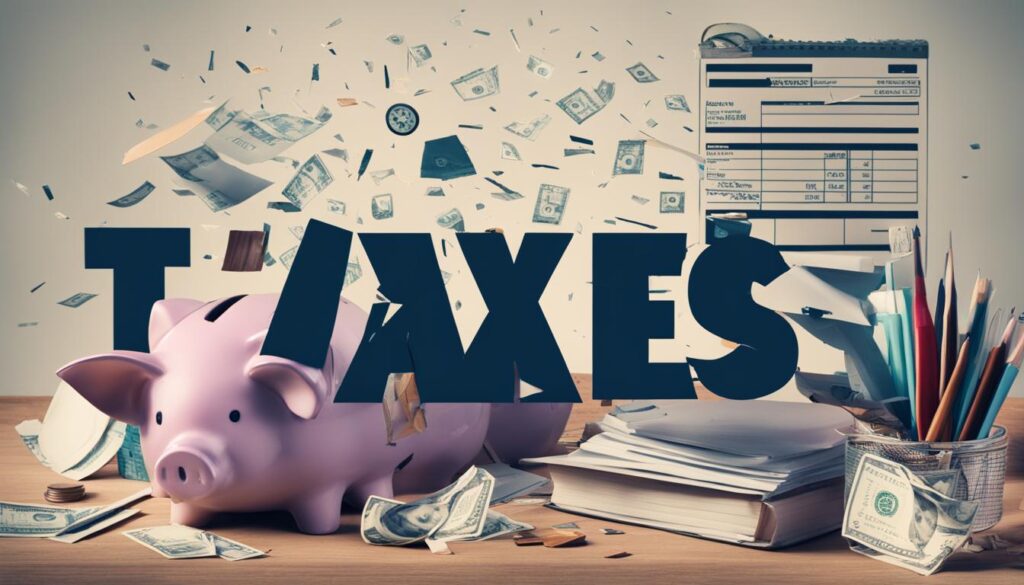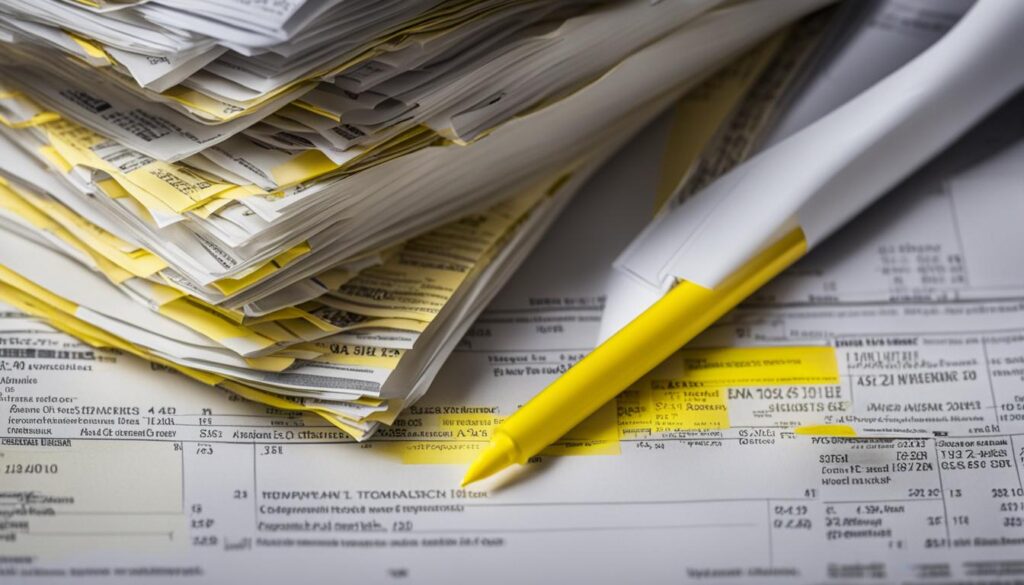A tax personal loan can be a smart financial solution when it comes to managing your taxes. It allows you to borrow money to cover your tax expenses and potentially deduct the interest payments. However, it’s important to navigate the complexities of taxes and understand the implications of taking out a personal loan for tax purposes.
This article will provide you with expert guidance on tax personal loans and how they can impact your finances.
Key Takeaways:
- A tax personal loan can help you manage your tax expenses by providing the funds needed to cover them.
- Interest payments on a tax personal loan may be tax deductible, potentially reducing your taxable income.
- It’s crucial to understand the tax implications and eligibility criteria before using a personal loan for tax purposes.
- Consider the benefits and risks associated with using a personal loan for taxes, and explore alternative options if necessary.
- Consult with a financial advisor to make an informed decision based on your specific financial situation.
Understanding Personal Loans for Taxes
A personal loan is a versatile financial tool that allows you to borrow a specific amount of money from a bank, credit union, or online lender. Personal loans usually come with fixed interest rates and predetermined repayment terms. These loans can be used for a variety of purposes, including paying taxes.
When it comes to personal loans for taxes, it’s important to understand their tax implications. In general, personal loan amounts are not considered taxable income, and the interest paid on personal loans is not deductible.
However, there are exceptions to this rule. Certain types of loans, such as student loans or business-related loans, may qualify for tax deductions. For example, interest payments on student loans are tax deductible, and the same applies to loans used for qualifying higher education expenses. Similarly, if you use a personal loan for business expenses, you may be eligible for a tax deduction on the interest payments.
Before using a personal loan for tax purposes, it’s crucial to consider the specific circumstances and consult with a tax professional. They can provide guidance on whether your loan qualifies for a deduction and help you make an informed decision.
Examples of Tax Deductible Personal Loans
| Loan Type | Tax Deductibility | Use Case |
|---|---|---|
| Student Loan | Yes | Qualifying higher education expenses |
| Business Loan | Yes | Business expenses |
Keep in mind that personal loans used for everyday expenses, such as personal taxes, are generally not tax deductible. It’s essential to review the specific tax laws and regulations applicable to your situation before using a personal loan for tax payments.
Benefits of Using a Personal Loan for Taxes

Using a personal loan to pay your taxes can offer several benefits. Firstly, personal loans often come with fixed interest rates and repayment periods, providing predictability in your monthly payments. If you have a good credit score, you may also qualify for low interest rates on personal loans. The application process is typically quick and simple, with funds being disbursed within a few days. Personal loans do not require collateral, so you don’t have to worry about losing assets like your home or car. Additionally, if you are expecting a tax return, you can use it to help pay off the loan.
Benefits of Using a Personal Loan for Taxes:
| Predictable Monthly Payments | Low Interest Rates | Quick Application Process | No Collateral Required | Guarantee of Tax Return |
|---|---|---|---|---|
| Provides predictability in your monthly payments | Qualify for low interest rates on personal loans with a good credit score | Quick and simple application process with funds disbursed within a few days | No need to provide collateral, protecting your assets | Use your expected tax return to help pay off the loan |
Risks of Using a Personal Loan for Taxes

While utilizing a personal loan to pay your taxes can provide advantages, it’s important to be aware of the potential risks involved. Here are some key considerations:
- Potentially High Interest Rates: Borrowers with less favorable credit may be subjected to higher interest rates on personal loans. It’s crucial to carefully review the terms and conditions to ensure you can manage the financial obligation effectively.
- Lender Fees: Lenders may impose various fees when obtaining a personal loan, including origination fees. These fees can add to the overall cost of the loan, impacting your financial situation.
- Potential Damage to Credit Score: Taking on debt through a personal loan can affect your credit score. If you struggle to make payments on time or default on the loan, it can have a negative impact on your creditworthiness.
- Increased Debt-to-Income Ratio: Borrowing a personal loan for taxes can increase your debt-to-income ratio, which represents the proportion of your monthly income that goes towards debt payments. A high debt-to-income ratio can make it more challenging to qualify for future loans or mortgages.
To make an informed decision, carefully evaluate your financial situation and consider the potential risks involved before using a personal loan to pay your taxes.
Alternatives to Using a Personal Loan for Taxes

If you are unable to pay your taxes, there are alternatives to using a personal loan. Exploring these alternatives can help you avoid incurring unnecessary debt and potentially save you money in interest payments. Let’s look at two common alternatives: the IRS payment plan and paying your taxes with a credit card.
The IRS Payment Plan
If you find yourself unable to pay your taxes in full, the IRS offers payment plans that allow you to make monthly installments. One option is the short-term 120-day payment plan, which gives you up to four months to pay your balance in full. This plan does not require you to pay any additional fees, but interest and penalties may still apply.
Another option is the long-term installment plan, which allows you to make monthly payments over an extended period. However, this plan involves a one-time setup fee and may also incur interest and penalties. It’s important to note that the interest rate charged by the IRS may be lower than the interest rate on a personal loan, making it a potentially more affordable option.
Paying Your Taxes with a Credit Card
If you have a credit card with favorable terms, you may consider using it to pay your taxes. Many credit card companies offer rewards or cashback incentives for using their cards, which can help offset the cost of paying your taxes. However, it’s essential to ensure that the interest rate on your credit card is lower than the rate on a personal loan, as high interest rates can quickly accumulate debt. Additionally, you should be aware of any potential fees associated with using a credit card for tax payments.
Personal Loan Tax Deductions for Higher Education Expenses

If you use a personal loan to pay for qualifying higher education expenses, you may be eligible for a tax deduction on the interest payments. Typically, this deduction applies to student loans. However, if you use a personal loan solely for qualifying educational expenses, you may also be able to deduct the interest. It’s important to note that the loan must be structured properly and the entire loan amount must be used for qualifying educational expenses in order to claim the deduction.
Qualified Educational Expenses
In order for the personal loan to be eligible for tax deductions, you must use it for qualifying educational expenses. These expenses include:
| Examples of Qualifying Educational Expenses |
|---|
| Tuition fees |
| Textbooks and course materials |
| Room and board |
| Transportation costs |
| Computers and educational software |
It’s important to keep detailed records and receipts of your educational expenses to support your tax deduction claim.
Loan Structure and Documentation
To ensure that your personal loan qualifies for the tax deduction, you must meet certain criteria:
- The loan must be solely used for qualifying educational expenses.
- Loan proceeds should be used to pay for eligible education costs directly.
- You must be able to demonstrate that the loan is specifically allocated for educational purposes.
- Documentation of educational expenses, loan agreements, and repayment schedules should be maintained.
Providing proper documentation and adhering to loan structure requirements will help to support your tax deduction claim.
Claiming the Tax Deduction
To claim the Tax Deduction for the interest payments on your personal loan used for higher education expenses, you will need to file Form 1098-E if you have paid $600 or more in interest during the tax year. The lender should provide you with this form, which you can use to report the interest deduction on your tax return.
It’s recommended to consult with a tax professional to ensure that you meet all the necessary requirements and guidelines for claiming the tax deduction.
Using a personal loan for higher education expenses can help make education more affordable and provide potential tax benefits. However, it’s important to carefully consider your options, understand the tax implications, and seek professional advice if needed.
Personal Loan Tax Deductions for Business Expenses

If you are a business owner and use a personal loan to pay for qualifying business expenses, you may be eligible for a tax deduction on the interest payments. Qualifying business expenses generally include expenses that are necessary for running or maintaining a business. These may include purchasing equipment, stocking inventory, or covering office supplies.
When using a personal loan for business expenses, it’s important to keep track of the amounts spent on qualifying expenses. You can deduct the interest on the loan proportionally to the amount spent on the business. For example, if 80% of the total loan amount is used for business expenses, you can deduct 80% of the interest paid on the loan.
To claim the deduction, it’s crucial to maintain accurate records and receipts to validate the business nature of the expenses. Additionally, the deductible status of the expenses may vary based on your relationship to the business and the nature of each expense. Consulting with a tax professional or accountant can provide further guidance on maximizing your tax deductions for business expenses.
Personal Loan Tax Deductions for Business Expenses
| Loan Amount | Portion Used for Business | Interest Paid | Business Deduction |
|---|---|---|---|
| $10,000 | $8,000 (80%) | $800 | $640 (80% of $800) |
| $15,000 | $12,000 (80%) | $1,200 | $960 (80% of $1,200) |
| $20,000 | $15,000 (75%) | $1,500 | $1,125 (75% of $1,500) |
Note: The table above is for illustrative purposes only and does not constitute financial advice. Consult with a qualified tax professional for personalized information relating to your specific situation.
By taking advantage of personal loan tax deductions for business expenses, you can reduce your taxable income and potentially save on your tax bill. However, it’s important to ensure that the expenses are legitimate and necessary for your business operations to avoid any potential audits or penalties.
Personal Loan Tax Deductions for Investment Expenses
In certain circumstances, you can deduct the interest on a personal loan if you use it to purchase qualifying investment assets, such as stocks or bonds. However, it’s important to note that leveraged investing can be risky and is generally not recommended for ordinary investors. Qualifying investments must be held outside of tax-advantaged accounts, and the deduction can only be taken against realized investment income. It’s crucial to seek professional financial advice before considering using a personal loan for investment expenses.
Investing in assets such as stocks or bonds can potentially yield significant returns. However, if you don’t have enough available funds, you might consider using a personal loan to finance your investment. In some cases, the interest paid on a personal loan used for qualifying investment expenses can be tax deductible.
Before diving into using a personal loan for investment purposes, it’s essential to understand the risks involved. Leveraged investing, which involves borrowing funds to amplify potential returns, can lead to substantial losses if the market doesn’t perform as expected. It requires a deep understanding of the investment landscape and a high tolerance for risk.
Additionally, the IRS has specific requirements for loans to qualify for tax deductions on investment expenses. The investments must be held outside of tax-advantaged accounts, such as IRAs or 401(k) plans. Furthermore, the deduction can only be taken against realized investment income, not unrealized gains.
It’s advisable to consult a professional financial advisor experienced in investment strategies before pursuing a personal loan for investment expenses. They can assess your investment goals, risk tolerance, and financial situation to provide personalized advice and help you make informed decisions.
While using a personal loan for investment expenses may have potential tax benefits, it’s crucial to carefully evaluate the risks and rewards involved. Your financial advisor can guide you in developing a comprehensive investment plan that aligns with your goals and risk tolerance.
Example of Deductible Investment Expenses
| Deductible Investment Expenses |
|---|
| Purchase of stocks |
| Purchase of bonds |
| Investment-related fees and expenses |
| Investment advisory fees |
| Margin interest expenses |
Please note that this table is a simplified example and not an exhaustive list of deductible investment expenses. The deductibility of these expenses depends on various factors, including the nature and purpose of the investment.
Understanding the Tax Implications of Personal Loans
When it comes to personal loans, understanding the tax implications is essential. Generally, personal loans do not have significant tax implications. The loan amount is not considered taxable income, and the interest and principal payments are not tax deductible unless the loan falls under one of the specific tax deduction categories mentioned earlier. However, it’s important to note that if a personal loan is forgiven, the forgiven amount may be considered taxable income in that year. Reporting any forgiven loans or interest payments correctly on your tax return is crucial.
While personal loans may not have direct tax benefits, it’s important to weigh the overall financial implications and evaluate if the loan is the right choice for your specific circumstances. Consulting with a tax professional can provide valuable guidance and ensure you make informed decisions regarding your personal loan and its impact on your taxes.
While personal loans can provide financial assistance, it’s important to understand the tax implications and potential consequences. By staying informed and making informed decisions, you can navigate the complexities of personal loans and manage your finances effectively.
Also Read : Spot Loan: Your Trusted Source For Fast Cash Advances
Conclusion
In conclusion, a tax personal loan can be a viable financial solution for paying your taxes. While personal loans in general may not be tax deductible or considered taxable income, there are specific circumstances where interest payments on a personal loan can be deducted. It’s important to carefully consider the benefits and risks of using a personal loan for tax purposes and explore alternative options before making a decision. Consulting with a financial advisor can provide valuable guidance based on your specific financial situation.
Personal Loan Options for Various Needs
Apart from using personal loans for tax purposes, there are numerous options available for personal loans to address various financial needs. Whether you’re planning a major purchase, covering unexpected expenses, or consolidating debt, personal loans offer flexibility. Different types of personal loans, such as signature loans, lines of credit, and secured loans, cater to different needs and come with their own features. Understanding these options and consulting with a lending specialist can help you find the right personal loan for your specific financial goals.
Finding the Right Personal Loan for Your Needs
When considering a personal loan, it’s essential to find the right option that suits your specific financial requirements. Start by evaluating the various loan options available to you. Research and compare interest rates, repayment terms, and fees associated with different lenders.
The application process for personal loans is typically straightforward and can be done online or in-person. Many lending institutions provide an easy-to-follow process, guiding you through the necessary steps. However, if you find the loan options overwhelming or have specific questions, it’s recommended to seek assistance from a lending team. They can help you understand your options better and provide personalized estimates based on your financial situation.
Before proceeding with any personal loan, make sure to carefully review and understand the loan terms. Pay close attention to interest rates, repayment schedules, fees, and any penalties associated with late payments or early repayments. It’s crucial to choose a loan with terms that align with your financial goals and capabilities.
Remember, personal loans can be powerful tools when used wisely. Take into account your overall financial situation and ability to comfortably repay the loan before finalizing any decision. By finding the right personal loan for your needs, you can effectively manage your financial responsibilities and achieve your goals.
FAQs
Q: Is a personal loan tax deductible?
A: No, in most cases, personal loan interest is not tax deductible. Only specific types of loans, such as those used for home mortgages or business purposes, may be eligible for tax deductions.
Q: Is a personal loan taxable?
A: Generally, personal loans are not considered taxable income. This means that the money you receive from a personal loan is not subject to federal income tax.
Q: How does a personal loan interest affect your taxes?
A: The interest you pay on a personal loan does not typically affect your taxes unless it is on a loan that is tax deductible, such as a mortgage or business loan. In those cases, the interest may be deductible, reducing your taxable income.
Q: What happens if a personal loan is forgiven?
A: If a personal loan is forgiven, it may be considered as income by the IRS, and you may receive a Form 1099-C from the lender. This forgiven debt could potentially affect your taxes and result in additional taxable income.
Q: Are personal loans considered income?
A: Generally, personal loans are not considered income because you are required to pay back the amount borrowed. However, if a portion of the personal loan is forgiven, that forgiven portion may be considered as income for tax purposes.
Q: Can a personal loan affect your taxes?
A: While personal loans generally aren’t taxable, if a portion of your loan is forgiven, it could affect your taxes by increasing your taxable income due to the forgiven debt being considered as income.
Q: Are personal loan interest tax deductible?
A: Personal loan interest is not usually tax deductible unless the loan is used for specific purposes such as home improvement or business expenses. In these cases, a portion of the interest may be deductible.
Q: Are personal loans considered part of your loan debt?
A: Yes, personal loans are considered part of your overall loan debt, and the repayments you make on the loan will contribute to reducing your overall debt burden.
Q: Are there specific types of loans that are not considered taxable?
A: Yes, personal loans are generally not considered taxable because they are not categorized as income. However, forgiven personal loans or portions of loans may be subject to income tax.
Q: Can using a personal loan to pay off debt have tax implications?
A: Using a personal loan to pay off other debt does not typically have direct tax implications, as it is simply a method of refinancing debt. However, if any portion of the loan is forgiven, it could have tax consequences.
Source Links
- https://www.smartcu.org/personal/personal-loans
- https://www.bankrate.com/taxes/pay-tax-bill-with-personal-loan/
- https://smartasset.com/taxes/is-personal-loan-interest-tax-deductible